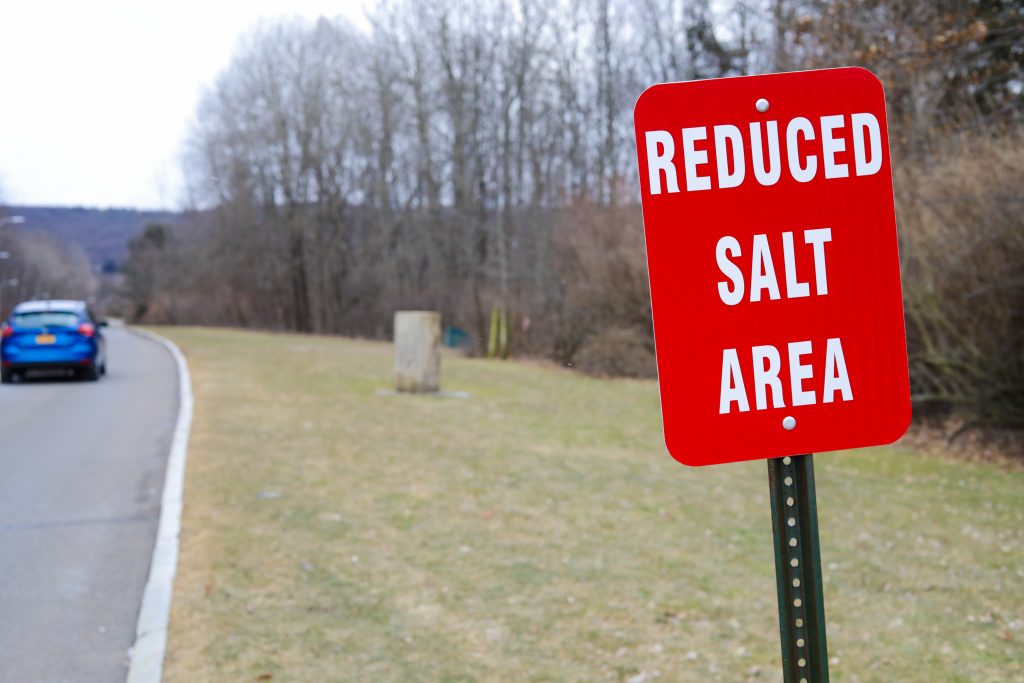
Every February and March, yellow-spotted salamanders migrate from College-in-the-Woods to the Nature Preserve. But with the amount of snow that has accumulated at Binghamton University this winter, the salamanders may face a more difficult challenge while migrating this year — salt.
Salt, which is used to melt snow and ice on pavement, is toxic to the salamanders, who have to cross Connector Road to complete their annual migration and lay eggs in Harpur Pond. According to Michael Armstrong, an instructor of biology, the salamanders are particularly susceptible to the effects of salt because of the way they breathe.
“An increased concentration of salt is going to be bad for any organism that has moist surfaces,” Armstrong said. “Salamanders, many of which who ‘breathe’ through their skin, are going to be affected because the salt is going to pull out their moisture in some way and so the moisture will not be produced at the same rate and it’s going to be unavailable in certain areas on the skin.”
Jessica Hua, an assistant professor of biology, said salt can have varying consequences for amphibians.
“At high concentrations, road salts can kill amphibians,” Hua said. “At lower concentrations, such as environmentally-related concentrations, road salts can make amphibians more susceptible to parasites.”
The University has tried taking the salamanders into consideration when making decisions about which roads to keep open during the winter and by regulating how much road salt they use on campus. Until the 2017-18 academic year, Connector Road was closed to traffic during the winter. But since then, the University has kept the road open throughout most of the year, closing it during March to allow the annual migration and designating it as a reduced salt area, which limits the amount of salt used on the road before, during and after winter storms.
According to Miranda Kearney, visiting assistant professor of biology, the salamanders continue to cross the road because they are used to their migratory patterns.
“There’s sort of a multi-spacial thing going on here which is that the salamanders always crossed Connector Road,” Kearney said. “And so now they’re still going to migrate, but up until last year they never had to deal with the salt.”
The salt on Connector Road may not be the only danger for the salamanders. Devin DiGiacopo, a fourth-year graduate student studying biology, said road salts can also spread through water and move from locations around the Nature Preserve into Harpur Pond. According to DiGiacopo, road salts in the water can have an effect on salamanders’ larvae.
“Road salts make their way from roads to water bodies through runoff during precipitation events, or through the movement of groundwater, and most amphibians spend at least one, but sometimes all, life stages in water and are therefore exposed quite frequently,” DiGiacopo said. “Even at lower levels, exposure to this stressor can reduce hatching success of eggs, and impede growth and development of larvae.”
Dylan Horvath, steward of BU’s natural areas, said the only ways to prevent salt from affecting salamanders would be to stop using salt on campus entirely or to use alternative options.
“It hasn’t been possible, yet, so the compromise is to hopefully lower the impact of salt on the salamanders,” Horvath said.
Horvath added that it’s important for the University to consider the environment when making decisions about surrounding roads and facilities.
“It’s a good thing that the University administration has taken into consideration the salamander migration when making decisions about the Connector Road,” Horvath said. “We should be able to care about other life besides ourselves and salamanders are important to the environment, which makes them important to humans even if humans don’t often realize it.”


